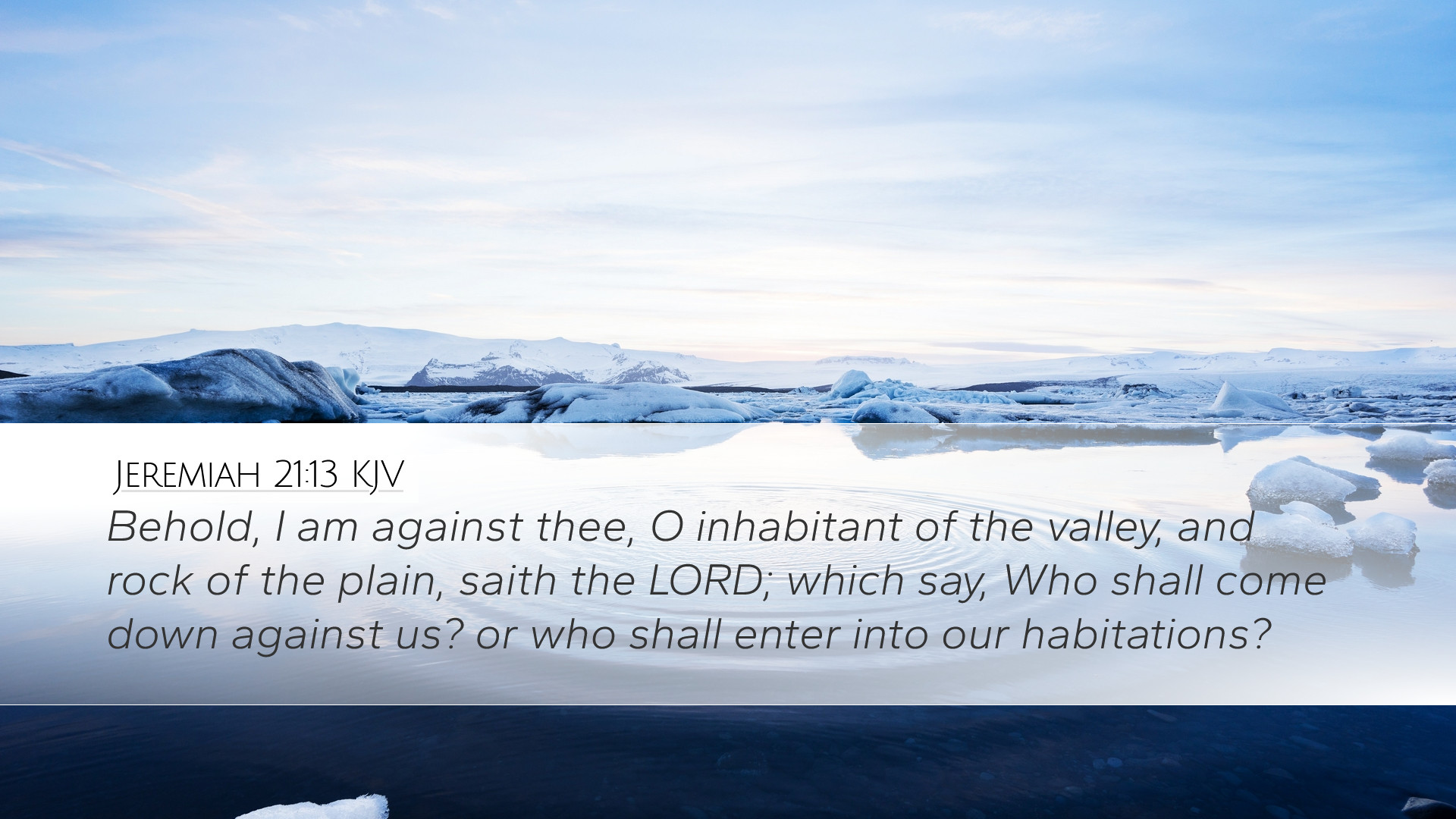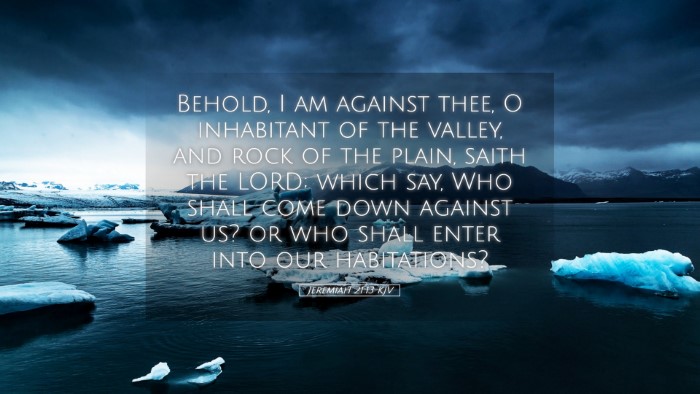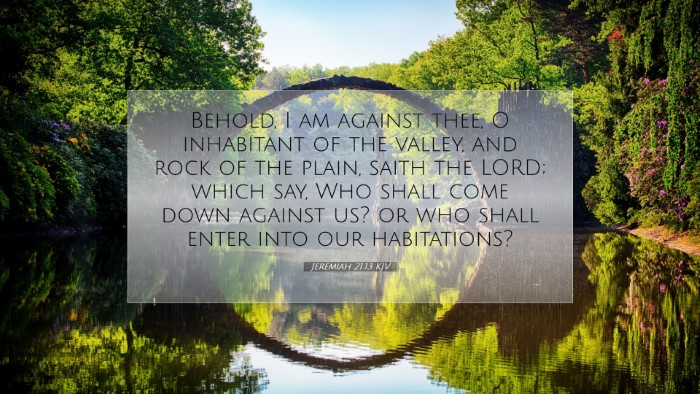Commentary on Jeremiah 21:13
Jeremiah 21:13 states: "Behold, I am against you, O inhabitant of the valley and rock of the plain,
saith the Lord; which say, Who shall come down against us? or who shall enter into our habitation?"
Understanding the Context
This verse occurs during a time of impending disaster for Jerusalem. The prophet Jeremiah was commissioned to deliver
messages of judgment and impending doom due to the sins of the people. This specific message targets the pride
and false security of Jerusalem, which viewed itself as invulnerable due to its geographical advantages and
divine protection.
Insights from Matthew Henry
Henry emphasizes the significance of God’s opposition to the inhabitants of Jerusalem. He notes that the
"inhabitant of the valley" can symbolize those who are in a low spiritual condition, possibly referring to those
who are living in complacency, unaware of the judgment that is to come. The "rock of the plain" suggests those
who trust in their fortress-like surroundings instead of in God.
Key Point: God’s declaration of being "against" them demonstrates His active opposition
to their sins. Henry points out that the inhabitants, in their arrogance, question who could challenge them,
showing their lack of fear and reverence for God.
Insights from Albert Barnes
Barnes interprets the expression "inhabitant of the valley" as a metaphor that signifies both literal and
spiritual meanings. The valley represents lowliness and vulnerability, while it also could refer to a dwelling
far from God. He notes that the phrase indicates a location of pride, as well as a deceptive sense of
security that they derived from their position.
Key Point: Barnes stresses that God's warning serves as a powerful reminder to all believers
about the dangers of pride and self-reliance. He emphasizes that despite their current perception of strength,
they are under God’s threat of judgment.
Insights from Adam Clarke
Clarke provides an in-depth exploration of the phrase "Behold, I am against you." He identifies this
as a formula often used to signify divine judgment throughout the scriptures. Clarke asserts that this
phrase encapsulates God’s active role in the affairs of men, particularly in delivering justice against
those who oppose Him.
He elaborates on the specific geographic references made in the verse. The inhabitants of the valley and the rock
suggest a comfort derived from a false sense of security; however, Clarke warns that no place can shield one
from divine retribution.
Key Point: Clarke's commentary serves to remind believers of the omnipresence of God in
judgment, emphasizing that God’s will cannot be thwarted by human arrogance or geographical advantages.
Theological Reflections
This verse provides profound theological implications regarding God’s sovereignty and human downfall. The
residents of Jerusalem, who underestimated God’s power due to their military and architectural fortifications,
faced dire consequences as a result of their unfaithfulness.
-
God’s Omniscience: The inhabitants' overconfidence reflects a foundational misunderstanding
of God's omniscient nature. The Lord sees beyond human security and perceived strength into the very hearts
of His people.
-
Pride Goes Before Destruction: This passage exemplifies the biblical truth that pride
precedes a fall (Proverbs 16:18). The citizens of Jerusalem are a cautionary example for modern believers,
emphasizing that true security is found in humility before God.
-
The Nature of True Refuge: Believers are reminded that ultimate safety and refuge lie not in
physical structures but in a genuine relationship with God. This calls for repentance and reliance on His
promises rather than human resources.
-
Preparation for Judgment: The verse serves as a warning about the eventual judgment that
follows disobedience to the Lord’s commandments—a theme that resonates throughout the prophetic literature.
-
Call to Action: This call against complacency urges pastors and theologians to challenge
their congregations towards active faith rather than passive existence in a world that desires to distract
from the truth of God’s word.
-
Hope Amidst Judgment: Despite the harshness of the message contained within this verse, it
underscores God’s desire to call His people back to Himself, offering hope for repentance and restoration.
-
Importance of Prophetic Voices: Jeremiah's role illustrates the challenge and responsibility
of prophetic voices within the community. The call to speak truth, despite hostile reception, is a
significant aspect of the prophetic ministry.
-
Examination of Spiritual Status: This verse invites self-examination among leaders and
congregants alike, reflecting on whether they may unconsciously trust in physical or social structures instead
of their faith in God.
-
Modern Implications: As contemporary believers engage with the world, this passage
compels them to consider where their true allegiance lies—has their security become a false idol?
-
Enduring Relevance: The message is timeless, reminding all faithful followers
of the importance of heeding God’s warnings and maintaining an active, living faith that reflects an earnest
pursuit of divine guidance and grace.
-
Call for Intercession: Finally, this commentary encourages a call to prayer—pursuing God’s
help in bringing about a revival of faithfulness in the face of contemporary challenges to faith.
Conclusion
Jeremiah 21:13 captures a pivotal moment in the prophetic ministry, reflecting themes of divine judgment,
human pride, and the hopeful call back to God. The collective insights of Henry, Barnes, and Clarke combine
to enhance our understanding of this profound text. For pastors, students, theologians, and scholars,
this verse should serve as both a warning and a clarion call to dependent faith in the face of contemporary
challenges, always recognizing that true refuge is found in God alone.


